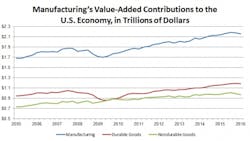Manufacturing Added Less to Real GDP in the First Quarter than in the Prior Two Quarters
As noted earlier, the U.S. economy grew by an annualized 1.1 percent in the first quarter, and the Bureau of Economic Analysis has now released data breaking out that growth by industry. In short, real value-added output in the manufacturing sector increased by 1.4 percent in the first quarter of 2016, slowing from 2.6 percent and 2.4 percent growth in the third and fourth quarters of 2015, respectively. As a result, manufacturers contributed 0.16 percentage points to headline growth in the first quarter, down from 0.31 percent and 0.29 percent in the prior two quarters.
[CHARTBEAT: 3]
Looking specifically at manufacturing in the first quarter, real value-added from nondurable goods firms rose 3.8 percent at the annual rate, but durable goods manufacturers saw output decline by 0.6 percent. Therefore, durable and nondurable goods businesses contributed -0.04 percent and 0.2 percent, respectively, to real GDP for the quarter.
Putting that figure in perspective, the largest contributors to real GDP growth in the first quarter were construction (0.36 percent), professional and business services (0.31 percent), health care and social assistance (0.28 percent) and retail trade (0.28 percent). In contrast, there were significant drags to growth from transportation and warehousing (-0.27 percent), mining (-0.15 percent) and utilities (-0.12 percent) in the first quarter.
ShopFloor is the blog of the National Association of Manufacturers (NAM).
About the Author

Chad Moutray
Chief Economist, National Association of Manufacturers
Chad Moutray is chief economist for the National Association of Manufacturers, where he serves as the NAM’s economic forecaster and spokesperson on economic issues. He frequently comments on current economic conditions for manufacturers through professional presentations and media interviews and has appeared on various news outlets. In addition, he is the director of the Center for Manufacturing Research at The Manufacturing Institute, the workforce development and education partner of the NAM, where he leads efforts to produce thought leadership, data and analysis of relevance to business leaders in the sector.
Prior to joining the NAM, Mr. Moutray was the chief economist and director of economic research for the Office of Advocacy at the U.S. Small Business Administration from 2002 to 2010. In that role, he was responsible for researching the importance of entrepreneurship to the U.S. economy and highlighting various issues of importance to small business owners, policymakers and academics. In addition to discussing economic and policy trends, his personal research focused on the importance of educational attainment to both self-employment and economic growth.
Prior to working at the SBA, Mr. Moutray was the dean of the School of Business Administration at Robert Morris College in Chicago (now part of Roosevelt University). Under his leadership, the business school had rapid growth, both adding new programs and new campuses. He began the development of an M.B.A. program that began accepting students after his departure and created a business institute for students to work with local businesses on classroom projects and internships.
Mr. Moutray is the vice chair of the Conference of Business Economists, and he is a former board member of the National Association for Business Economics, where he is the co-chair of the Manufacturing Roundtable. He is also the former president and chairman of the National Economists Club, the local NABE chapter for Washington, D.C.
He holds a Ph.D. in economics from Southern Illinois University at Carbondale and bachelor’s and master’s degrees in economics from Eastern Illinois University. He is a Certified Business Economist™, where he was part of the initial graduating class in 2015.
In 2014, he received the Outstanding Graduate Alumni Award from EIU, and in 2015, he accepted the Alumnus Achievement Award from Lake Land College in Mattoon, Illinois, where he earned his associate degree in business administration. He serves on the external economics advisory board for the SIUC’s School of Analytics, Finance and Economics.
